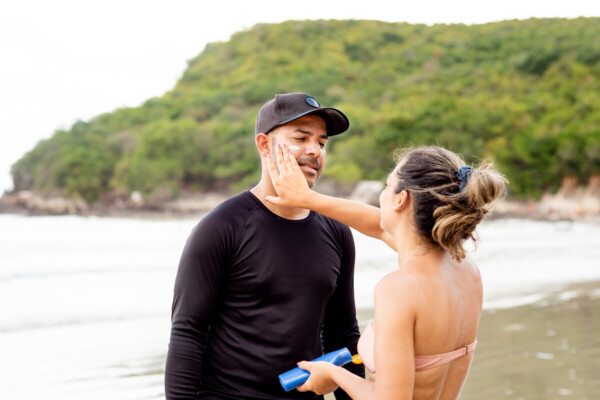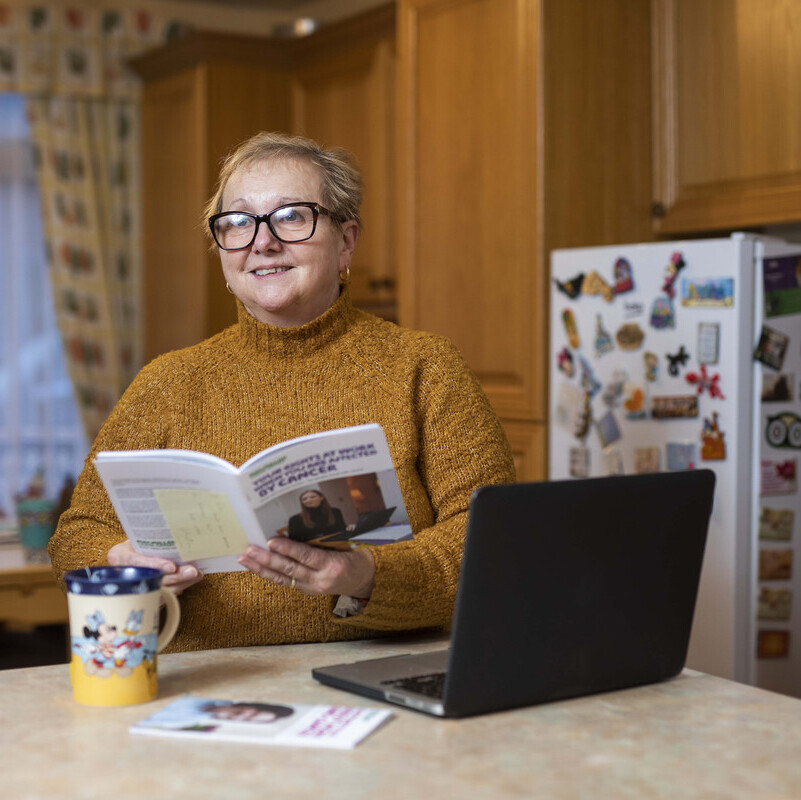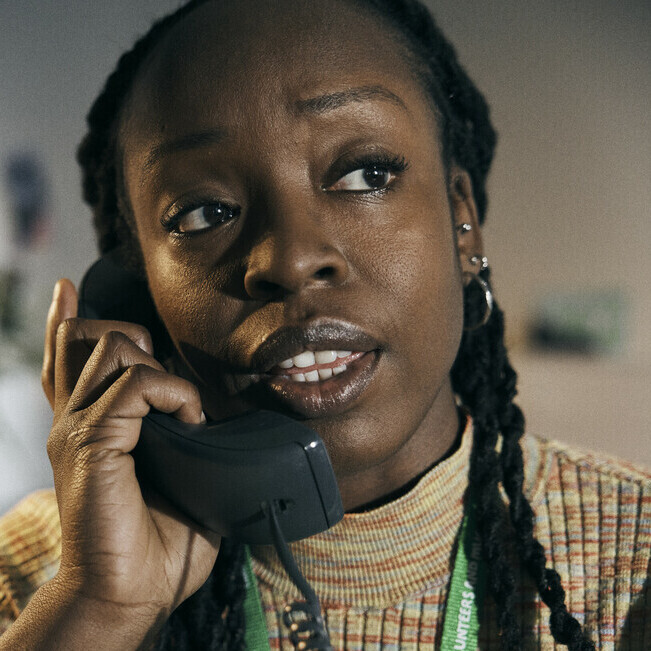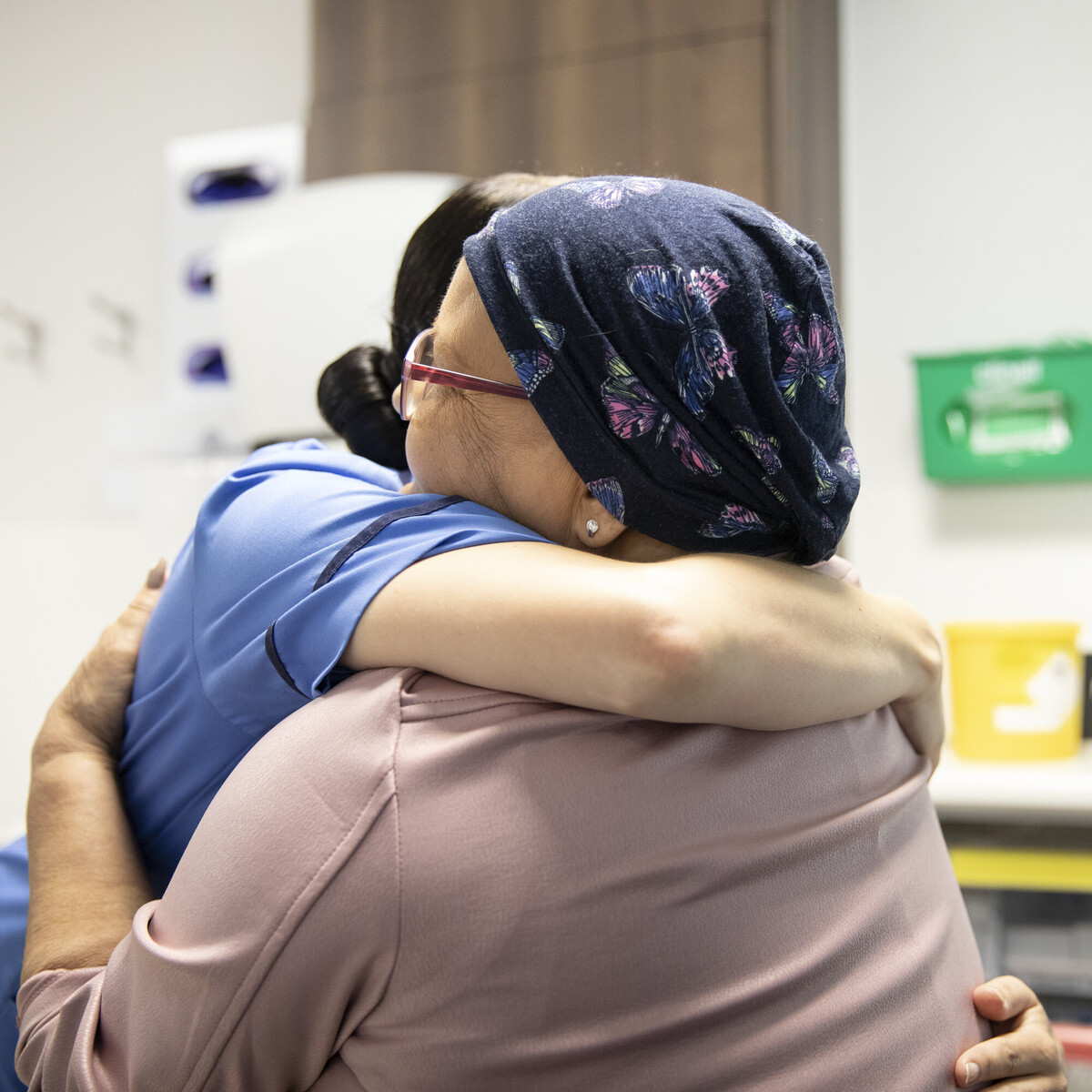Skin Cancer Awareness Month
May is skin cancer awareness month. Whether you are directly affected by skin cancer, or you just want to find out more, we have information that can help.
For skin cancer awareness month we have answered some of the most frequently asked questions about skin cancer.


Frequently asked questions about skin cancer
-
What are the different types of skin cancer?
There are three main types of skin cancer:
- basal cell carcinoma (BCCs)
- squamous cell carcinoma (SCCs)
- melanoma.
BCCs and SCCs are different from melanoma. They are called non-melanoma skin cancers and are more common than melanoma.
-
What is the main cause of skin cancer and am I at risk?
Most skin cancers are caused by skin damage that happens from exposure to ultraviolet (UV) light from the sun or sunbeds.
All types of skin are at risk of sun damage and skin cancer.
The risk is highest if you have skin that tends to burn easily, or freckle in the sun.
If you have black or brown skin, you can get skin cancer but it is less likely. You still need to protect your skin from the sun and check for anything unusual.
It is important for everyone to follow skin protection advice and to check their skin regularly. If you are worried, we have more information about causes and risk factors of non-melanoma skin cancer and causes and risk factors of melanoma.
-
What can I do to prevent skin cancer?
The best protection is to cover up and be safe in the sun. It’s important to check your skin regularly and tell your GP if you notice any unexplained skin changes.
Using sunbeds or sunlamps also increases your risk of developing skin cancer. These devices use high levels of the same harmful UV radiation found in sunlight. They are not recommended by healthcare professionals except for specific skin conditions where UV therapy can be used as a prescribed treatment.
-
How can I be safe in the sun?
Our top tips for staying safe in the sun:
- Use 5* UVA with at least an SPF 30. Usually, the instructions are to re-apply every 2 hours, or more often if you have been swimming or exercising.
- Drink plenty of water.
- Cover up with a hat and long sleeves. Wear a wide-brimmed hat to protect your face and neck.
- Wear UV blocking sunglasses to protect your eyes.
In the UK, sun damage to the skin is most likely between 11am and 3pm between March and October. But sunlight can be strong enough to cause sunburn at other times of the day and year, and sometimes even on cloudy days.
Do not use a sunbed or sunlamp. If it is important for you to look tanned, use fake tan lotions or sprays.
Read more advice about sun safety and cancer treatment.
-
How should I properly apply sun cream?
- Many people do not use enough sun cream. Experts say an average-sized adult needs at least 6 to 8 teaspoons of lotion to give the SPF coverage it says on the bottle.
- Make sure you apply to clean and dry skin.
- Apply sun cream about 20-30 minutes before you go out into the sun.
- Don't forget to apply sun cream to those easy to miss places - lips, tops of ears, back of neck, feet and scalp.
- Reapply every 2 hours, or immediately after swimming, towelling dry or if you’ve been sweating a lot.
Top tip: Make sure your sun cream is not out of date. Most sun creams have a shelf life of two years. If the product is seeping liquid or smells ‘off’, it should be replaced.
-
What are the symptoms of skin cancer?
Different types of skin cancer can vary in how they look. And if you have black or brown skin, some skin symptoms may be less obvious. Some possible symptoms are listed below. But if you have any skin change that is ongoing, unexplained or unusual for you, make an appointment with your GP.
- A new or changing mole
A new mole or a mole that changes shape, colour or size can be a symptom of melanoma skin cancer.
- A lump on the skin
Some skin cancers start as a lump on the skin. You can find out more in our information about symptoms of non-melanoma skin cancer.
- A patch of scaly, crusty or rough skin
Some skin cancers cause a patch of scaly, crusty, irritated or rough skin rather than a lump. You can find out more in our information about symptoms of non-melanoma skin cancer.
- Sores or scabs
Most sores heal very quickly. If you have a sore or ulcer anywhere on your skin that does not heal after 3 weeks, ask your GP to check it.
- Changes under the nails or on the palms or soles
Acral lentiginous melanoma is an uncommon type of Melanoma. But it is more common in Black and Asian people. It usually develops in areas of skin that get little sun exposure, such as:
• the palms of the hands
• soles of the feet
• nail areas, for example under the fingernails or toenails.
- A new or changing mole
-
How much SPF do I need?
Use a 5* UVA cream with at least an SPF 30. Follow the instructions on the bottle and re-apply as recommended, particularly after swimming. Make sure you use enough. About 6 to 8 teaspoons is enough to cover most adults – for example, use 1 teaspoon for each limb, 1 for the front of your chest, 1 for your back, 1 for your head and neck.
Support for people affected by skin cancer
We provide services for people affected by cancer. This includes understanding diagnosis and treatment, financial advice and offering a listening ear when times are tough. If you or a loved one has been diagnosed with skin cancer, there is lots of support available.

Information on our website
Learn about non-melanoma skin cancers, including SCC and BCC, and melanoma.
You can listen to our skin cancer audiobooks:
Or, download our booklets:

Help from Macmillan
- Call the Macmillan Support Line for free on 0808 808 00 00 (open 7 days a week 8am to 8pm). Or email the Macmillan Support Line.
- The Skin cancer forum on our Online Community is a place to chat to others who know what you or your loved one are going through.
- Use our get support guide by answering some quick questions to get information tailored to you or your loved one's situation.
- Find out more about the different ways Macmillan can help.

Support near you
Ways to help this skin cancer awareness month
Macmillan is here for everybody living with cancer, with our specialist information, support and services. But we couldn't do it without our incredible supporters. Here are a few ways you can get involved.





